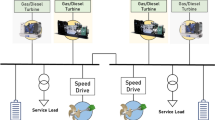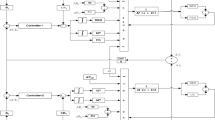Abstract
With the vigorous development of the scientific and technological revolution, new military and engineering loads with high power and pulse characteristics are becoming reality for the shipboard power system (SPS) application. These loads are usually called high-power pulsed loads (HPPLs) because of their high peak power, low average power and short cycle time. The HPPLs can cause voltage drop and even system instability to the SPS, thus bringing severe challenges to their power supplying system. To address these issues, an optimal operation schedule of HPPLs in SPS is studied in this paper. Firstly, the models of HPPLs for SPS power optimization are proposed based on the real back-end load connection way of them. Then the mixed integer programming problem aiming at maximizing the operation efficiency of the HPPLs within the SPS support capability is constructed. Finally, some typical cases are studied to verify the flexibility and effectiveness of the proposed strategy. The results indicate that the proposed strategy can effectively maximize the operational efficiency of HPPLs in the SPS, and the superiority becomes more obvious as the number of HPPLs increases.










Similar content being viewed by others
References
Liu Y, Wang H, Zhang Q, Wen Y, Hu W, Zhang H (2021) Power distribution strategy based on state of charge balance for hybrid energy storage systems in all-electric ships. J Power Electron 21:1213–1224
Ma W, Lu J (2016) Electromagnetic launch technology. J Natl Univ Defense Technol 38(6):1–5
Pfeifer A, Prebeg P, Dui N (2020) Challenges and opportunities of zero emission ship** in smart islands: a study of zero emission ferry lines. eTransportation 3:100048
Khan MMS, Smith BL, Parvania M (2019) Supercapacitor for high-dynamic load management in MVDC shipboard power systems. In: 2019 IEEE electric ship technologies symposium (ESTS), pp 219–225
Duan J, Xu H, Liu W, Peng J, Jiang H (2020) Zero-sum game based cooperative control for on board pulsed power load accommodation. IEEE Trans Industr Inf 16(1):238–247
Vu TV, Gonsoulin D, Diaz F, Edrington CS, El-Mezyani T (2017) Predictive control for energy management in ship power systems under high-power ramp rate loads. IEEE Trans Energy Convers 32(2):788–797
Crider JM, Sudhoff SD (2010) Reducing impact of pulsed power loads on microgrid power systems. IEEE Trans Smart Grid 1(3):270–277
Steurer M et al (2007) Investigating the impact of pulsed power charging demands on shipboard power quality. In: 2007 IEEE electric ship technologies symposium, pp 315–321
Doerry N, Amy J (2015) MVDC shipboard power system considerations for electromagnetic railguns. In: 6th DOD electromagnetic railgun workshop, pp 1–8
Domaschk LN, Ouroua A, Hebner RE, Bowlin OE, Colson WB (2007) Coordination of large pulsed loads on future electric ships. IEEE Trans Magn 43(1):450–455
Im W, Wang C, Tan L, Liu W, Liu L (2016) Cooperative controls for pulsed power load accommodation in a shipboard power system. IEEE Trans Power Syst 31(6):5181–5189
Shi M, Wang J, Huang K, Yan J (2018) Optimization control strategy of hybrid energy storage system for isolated microgrid with pulse load. Inf Technol Netw Saf 37(6):125–129
Lashway CR, Elsayed AT, Mohammed OA (2016) Hybrid energy storage management in ship power systems with multiple pulsed loads. Electr Power Syst Res 141:50–62
Faddel S, Saad AA, Hariri ME, Mohammed OA (2020) Coordination of hybrid energy storage for ship power systems with pulsed loads. IEEE Trans Ind Appl 56(2):1136–1145
Stevens JD, Opila DF, Cramer AM, Zivi EL (2015) Operational vignette-based electric warship load demand. In: 2015 IEEE electric ship technologies symposium (ESTS), pp 213–218. https://doi.org/10.1109/ESTS.2015.7157890
Stevens JD, Opila DF, Oh ES, Zivi EL (2017) All-electric warship load demand model for power and energy system analysis using exogenously initiated threats. In: 2017 IEEE electric ship technologies symposium (ESTS), pp 486–492
**e R, Chen Y, Li F, Wang Z, and Mei S (2018) Operationally constrained optimal dispatch of multiple pulsed loads in an isolated microgrid. In: 2018 IEEE power and energy society general meeting (PESGM), pp 1–5
Cassimere B, Valdez CR, Sudhoff S, Pekarek S, Zivi E (2005) System impact of pulsed power loads on a laboratory scale integrated fight through power (IFTP) system. In: 2005 IEEE electric ship technologies symposium (ESTS), pp 176–183
Gao X, Zhang Y, Ji F, Fu L (2022) A demand side management strategy to reduce the impact of high power pulse load integration. J Electr Eng Technol 17(5):2663–2674
Li F, Chen Y, **e R, Shen C, Zhang L, Qin B (2018) Optimal operation planning for orchestrating multiple pulsed loads with transient stability constraints in isolated power systems. IEEE Access 6:18685–18693
Zhang Y, Zhang T, Wang R, Liu Y, Guo B (2015) Optimal operation of a smart residential microgrid based on model predictive control by considering uncertainties and storage impacts. Sol Energy 122:1052–1065
Zhang Y, Jiang J, Zhang X (2021) A hierarchical genetic algorithm and mixed-integer linear programming-based stochastic optimization of the configuration of integrated trigeneration energy systems. Clean Technol Environ Policy 23:1913–1927
Acknowledgements
This project is supported by National Natural Science Foundation of China under Grant 51877211.
Author information
Authors and Affiliations
Corresponding author
Ethics declarations
Conflict of interest
The authors declare that they have no known competing financial interests or personal relationships that could have appeared to influence that work reported in this paper.
Additional information
Publisher's Note
Springer Nature remains neutral with regard to jurisdictional claims in published maps and institutional affiliations.
Rights and permissions
Springer Nature or its licensor (e.g. a society or other partner) holds exclusive rights to this article under a publishing agreement with the author(s) or other rightsholder(s); author self-archiving of the accepted manuscript version of this article is solely governed by the terms of such publishing agreement and applicable law.
About this article
Cite this article
Zhang, Y., Ji, F., Gao, X. et al. Optimal Operation Schedule Strategy of High-power Pulsed Loads in Shipboard Power System. J. Electr. Eng. Technol. 19, 2089–2101 (2024). https://doi.org/10.1007/s42835-023-01706-6
Received:
Revised:
Accepted:
Published:
Issue Date:
DOI: https://doi.org/10.1007/s42835-023-01706-6




